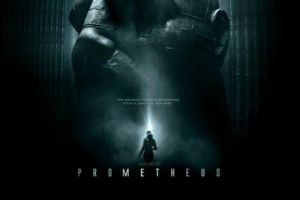‘Prometheus’ Movie Review
June 12, 2012
Ridley Scott, you’re a conniving jerk.
Creating an origins story about a race of terrifying and disgustingly brutal aliens was pretty brilliant. Now you’re making audiences–which includes me–wait a few more years for more movies which explain more of the story? You jerk.
Granted, it was Scott’s ideal from the beginning. Starting with the first movie, “Alien” (1979), Scott had a spark of brilliance: create a lengthy story arc involving the life and death of the Xenomorphs, a.k.a. the creepy mouth-inside-mouth, acid-for-blood, parasitic aliens. Within the first film, Scott introduced audiences to a very organic and gruesome monster. It was also scary as hell, what with face-huggers and larvae popping out of people’s chests and the like.
“Prometheus” sets out to explain the story of Xenomorphs from the very beginning. And, actually, upon watching the film, it isn’t really a story about the aliens. It’s a story about the people involved in the wreckage of a huge inter-galactic expedition. According to Scott and the film’s writer, Damon Lindelof, it was intended to stray away from the original “Alien,” and tell its own story.
Well it certainly did that, and with grandeur I have not seen before. The $130 million budget was money well spent, as the opening credits roll with IMAX-worthy shots of Iceland and Scotland. From there it introduces the titular characters, Elizabeth Shaw (Noomi Rapace, from the Swedish Girl with the Dragon Tattoo), and Charlie Holloway (Logan Marshall-Green, a relatively-unknown actor who will become a big name very soon).
Shaw and Holloway are archaeologists and lovers, searching for an answer to life’s big question: where did humans come from? They discover maps detailed in cave paintings and stonework across the globe, from many famous– and unconnected–ancient cultures. The map shows a constellation millions of lightyears away from Earth, and they have interpreted it as an “invitation” from the creators of humanity. An elderly uber-rich man named Peter Weyland (played by Guy Pierce in prosthetics, making him look very old) funds the expedition, and the creation of a new scientific vessel named Prometheus.
In ancient Greek mythology, Prometheus was a prankster who created mankind from clay, and gave humans the ability to use fire, thereby furthering and advancing civilization. In classic Western culture, Prometheus represents human exploration, usually for scientific knowledge, and the risks or consequences involved. Kind of a dooming name for a space-ship, then.
The star map leads the crew of the Prometheus to a set of coordinates–the distant moon LV-223. As in the previous “Alien” films, the crew travels in stasis, a state of heavy sleep, for 2 years while they are monitored by David, the stead-fast android played memorably by Michael Fassbender (who was a young Magneto in “X-Men: First Class”). David will come to learn much about human interaction and curiosity as the film advances.
I’m afraid I cannot reveal much more without spoiling the entire film. Let’s just say it leaves some questions unanswered, and that’s angered some audiences. Keep in mind that Ridley Scott and Damon Lindelof intended it that way, just in case they could make a sequel. In which case, Scott is quoted as saying that “the next film would further stray from the Alien series, and go on its own exploration.” Sounds good to me, as long as you maintain the heavy amount of sci-fi realism that I fell in love with in the first “Alien.”
As the end credits rolled, “Prometheus” left me speechless and awe-struck; that’s a rare feat. It takes a very good movie with subject matter close to my heart to do that. “Prometheus” struck a deep inner chord with me, touching on the romance and danger of space exploration, but also the inherent consequences of human exploration. It asked the eons-old question, “where did humans come from?” In real life, there is no easy answer for this. In the film, it remains unanswered.
The film does answer, however, where the horrifying Xenomorphs come from. For that, I praise Ridley Scott and his writer Lindelof. But for the questions about humanity, the curiosity piqued amongst us about our own origins, left unanswered? You’re a jerk, Scott. I love you, but you’re a jerk.
Prometheus: 4 out of 5 Top Hats. Rated “R” for a couple of F-bombs, and the particularly gross nature of aliens. Also, sci-fi violence. Not suitable for young kids… or some squeamish adults.



